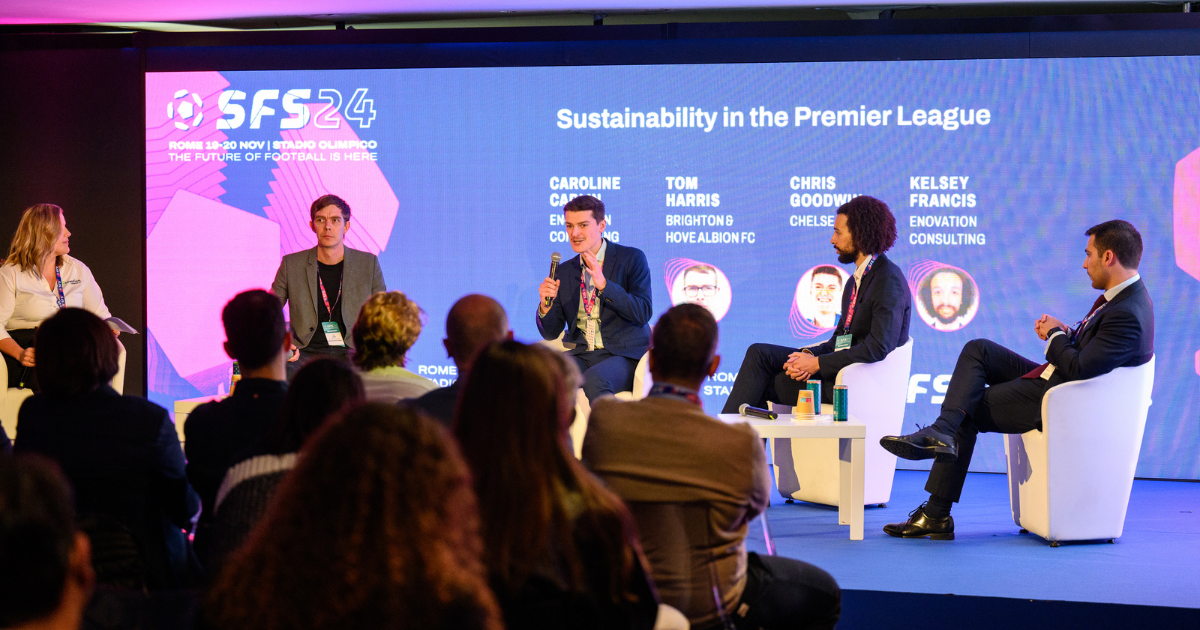
Premier League’s Green Revolution: ESG, Innovation and Passion for Football
During an engaging panel organized by SFS24, industry experts and managers examined the crucial role of sustainability in soccer, focusing on how Premier League clubs are adopting environmental, social and governance (ESG) strategies to innovate and transform their operating model.
The panel featured prominent figures such as Tom Harris, Sustainability Manager Brighton & Hove Albion FC; Chris Goodwin, ESG Manager Chelsea FC; Caroline Carlin, Head of Clients and Sustainability Enovation Consulting; and Kelsey Francis, Senior ESG Reporting and Communications Manager also of Enovation Consulting. Speakers explored topics such as reducing environmental footprint, balancing sustainable goals and competitive performance, and using data and innovation to create lasting impact.
During the discussion, it emerged how most of the 20 Premier League clubs have implemented ESG strategies and dedicated policies. “Many best practices have been put in place to create a solid ESG profile, and clubs explain exactly what they do,” said Kelsey Francis, stressing the importance of clear communication to avoid greenwashing. Brighton’s experience working on sustainable projects for more than a decade through new technologies and a long-term strategic approach was cited as an example of success, where detailed reporting and target analysis are key elements.
An additional element highlighted relates to sustainable transportation and the fan experience. “Seventy-five percent of trips to the stadium are made on sustainable terms, with benefits such as free public transportation for fans,” explained one of the speakers, illustrating how environmental policies dovetail perfectly with improving thespectator experience. In addition, data collected show that “71 percent of PL fans believe that clubs should have a positive impact in environmental issues. And this also translates into commercial appreciation,” said Chris Goodwin, highlighting the dual ethical and economic benefits of sustainable initiatives.
The discussion also touched on the difficulties associated with change, such as the necessary courage to move away from naming partners tied to fossil fuels. Experts pointed out that teamwork, including joint investment, can trigger a positive domino effect among clubs. And how do you avoid greenwashing? “With transparency about what is actually being done and what the club’s ambitions are, as well as clarifying how results are going to be measured, ” Kelsey Francis pointed out, urging clubs to remove the stigma attached to any shortcomings and authentically communicate their actions; a call for transparent communication that Tom Harris also wanted to join, for whom “creating cohesive and trained teams is the first key step when it comes to sustainability.”
The panel concluded by highlighting how the sustainable approach is not only a response to environmental challenges, but also an opportunity to improve the fan experience and strengthen commercial positioning. The adoption of transparent and measurable policies, along with collaboration among clubs, promises to generate a positive emulation phenomenon in the industry. The future of soccer, therefore, is looking increasingly toward a holistic model in which sustainability becomes a key pillar for growth and innovation. To conclude, the panel offered an in-depth look at the Premier League ‘s path toward a greener future, demonstrating that, with commitment and transparency, soccer can be an engine for social and environmental change.



